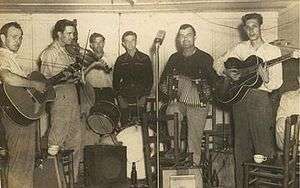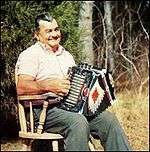Nathan Abshire
| Nathan Abshire | |
|---|---|
|
Nathan Abshire | |
| Background information | |
| Birth name | Nathan Abshire |
| Born |
June 27, 1913 [1] Gueydan, Louisiana, United States [1] |
| Died | May 13, 1981 (aged 67) [1] |
| Genres | Cajun music, swamp blues, Louisiana blues |
| Occupation(s) | Accordion player |
| Years active | 1930s–1981 |
| Labels | Bluebird Records, O.T. Records, Khoury Records, Swallow Records |
Nathan Abshire (June 27, 1913 near Gueydan, Louisiana[1] – May 13, 1981 in Basile, Louisiana[1])[2] was an American Cajun accordion player who, along with Iry LeJeune, was responsible for the renaissance of the accordion in Cajun music in the 1940s.
Career

Learning the accordion at age six, he was influenced by his father, mother, and uncle all playing the accordion.[3] Abshire first performed on the accordion in public at age eight. He continued playing at dance halls and parties through his teenage years. In the 1930s, he performed with and learned from fiddler Lionel Leleux and accordionist Amédé Ardoin.[4] In 1935, he recorded six songs with the Rayne-Bo Ramblers, a group led by guitarist and singer Leroy "Happy Fats" Leblanc.[5]
Abshire served in the U.S. military during World War II.[6] After the war, he settled in Basile, Louisiana, where he played regularly at the Avalon Club. He released his best-known record, "Pine Grove Blues", in 1949,[7] a song based on Amede Breaux's "Le Blues de Petit Chien",[8] as well as several recordings on Swallow Records and Arhoolie Records in the 1960s. He appeared with Dewey Balfa and The Balfa Brothers at the Newport Folk Festival in 1967.[3] Along with Balfa, Abshire devoted much of his time in the 1960s and 70s to promoting Cajun music through appearances at festivals, colleges, and schools throughout the United States.
Abshire was featured in Les Blank's 1971 documentary Spend It All and the 1975 PBS documentary, The Good Times Are Killing Me.[9] He was also included in the documentary film, Les Blues de Balfa, along with Balfa.
He died in Basile, Louisiana in 1981 after living most his life there as the overseer of the town dump.
Discography
Compilations
- Cajun Fais Do Do (5004 Arhoolie, 1966)
- Nathan Abshire & His Cajun Accordion- Pine Grove Blues (LP 6014 Swallow Records, 1968)
- Nathan Abshire & Other Cajun Gems: Vol.2 from the Khoury vaults (5013 Arhoolie, 1972)
- Louisiana Cajun Music Volume 4: From The 30s To The 50s (OT 111 Old Timey Records, 1972)
- The Cajuns - Vol.1: Balfa Brothers Orchestra With Nathan Abshire (SNTF 643 Sonet, 1973)
- Nathan Abshire: The Good Times Are Killing Me Featuring The Balfa Brothers (LP 6023 Swallow, 1975)
- A Cajun Tradition (LL 139 La Louisiane)
- A Cajun Tradition Vol. 2 (LL 144 La Louisiane, 1978)
- Nathan Abshire And The Pinegrove Boys (FLY LP 535 Flyright, 1978)
- Nathan Abshire: Good Times Are Killin' Me" (SNTF 776 SONET, 1978)
- Nathan Abshire Featuring Balfa Brothers: The Good Times Are Killing Me (LP 6023 REISSUE Swallow, 1986)
- Louisiana Cajun: Special No. 2 (CH 166 Ace Records, 1986)
- Pine Grove Blues (CHD 217 Ace Records, 1987)
- Cajun Country French Classics Vol. 3 (LL-145 La Louisiane, 1987)
- Pioneers of Cajun Accordion 1926-1936 (LPOT128 Old Timey / Arhoolie, 1989)
- A Cajun Legend... The Best of Nathan Abshire (SW 6061 Swallow, 1991)
- Pine Grove Blues/The Good Times Are Killing Me (CDCHD 329 Ace Records, 1991)
- French Blues (Arhoolie, 1993)
- Nathan Abshire: The Great Cajun Accordionist (CDCHD 401 Ace Records, 1993)
- Les Haricots Sont Pas Salés (CP01 934 Cinq Planètes, 1997)
- Balfa Brothers & Nathan Abshire - The 1970 NYC Cajun Concert (FRC111 Field Recorders' Collective, 2008)
- Master Of The Cajun Accordion: The Classic Swallow Recordings (CDCHD 1348 Ace Records, 2014)
See also
References
- 1 2 3 4 5 Woodstra, Chris; Erlewine, Stephen Thomas; Bogdanov, Vladimir; Erlewine, Michael (1997). All Music Guide to Country: The Experts' Guide to the Best Country Recordings (1st ed.). Backbeat Books. p. 1. ISBN 978-0879304751.
- ↑ "Thedeadrockstarsclub.com 1980s". Retrieved 2014-06-10.
- 1 2 Ancelet, Barry Jean (1999). Cajun and Creole Music Makers: Musiciens cadiens et créoles (2nd ed.). University Press of Mississippi. p. 101. ISBN 978-1578061709.
- ↑ Hahn, Roger. "Nathan Abshire". Retrieved 2014-06-10.
- ↑ Bush, John. "Nathan Abshire". Retrieved 2014-06-10.
- ↑ Henderson, Lol; Stacey, Lee (1999). Encyclopedia of Music in the 20th Century. Routledge. p. 8. ISBN 978-1579580797.
- ↑ "Nathan Abshire & the Pine Grove Boys - French Blues". Retrieved 2014-06-10.
- ↑ Caffery, Joshua Clegg (2013). Traditional Music in Coastal Louisiana: The 1934 Lomax Recordings. Louisiana State University Press. ISBN 978-0807152010.
- ↑ Boyle, Deirdre (1997). Subject to Change: Guerrilla Television Revisited (1st ed.). Oxford University Press. p. 148. ISBN 978-0195110548.
- American National Biography, vol. 1, pp. 48–49.
- American National Biography, vol. 3 pp. 38–39.
External links
- VH1.com biography
- clips from singles on the Swallow and La Louisianne labels
- TVTV's Documentary The Good Times Are Killing Me
